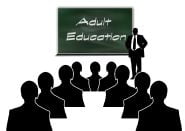Adult learning has evolved over the last two decades. Whilst still the place to learn self-improvement skills such as crafts and languages, the role of adult learning has a strong focus now towards enhancing entry level life skills, improving employability opportunities and all the time instilling self-confidence in each and every learner who steps through the door to sign up for a course.
Whereas attending school is mandatory, making in-roads in exploring adult learning is a personal choice and behind every learner who arrives for their first teaching session is an individual story to tell; a life of choices which has brought them to make the decision to enhance their learning through their chosen course.
For some, stepping into a classroom after many years – and often decades after leaving school is a major achievement in itself. This is particularly so if the learner had a negative experience when younger and so returning to education is a personal challenge to overcome.
For others, it’s about facing a life-changing situation such as returning to work after a long spell of maternity leave and finding that the job market no longer matches previous experience, or the often difficult situation faced by someone recently made redundant who could be looking at completely re-training at a time in their life they felt they should be making plans to take life a little easier rather than having to completely start again.
For yet more learners, it’s the thrill of personal development and the joy of learning a new skill; whether it helps them with their career or not, many sign up to adult learning because they want to explore different interests and hobbies and to then either advance these skills to a more advanced level, or to simply know they have tried something a little different.
Employability
Many people now find themselves facing career changes at very unexpected times in their life. The phrase ‘a job for life’ no longer exists and adult learning provides a much needed support mechanism in offering courses in both core subjects such as literacy and numeracy as well as employment specific offerings which can act as a springboard to gaining new employment. Popular choices include manual and computerised bookkeeping, graphic design and various working with computers courses such as Word applications where the learner did not need to use a computer in a specific way in the past or may not have the particular skills which will make their CV really stand out.
Lifeskills
Many who enter adult learning tell of leaving school early for a multitude of reasons and are looking to get a grounding in the basics of a number of life skills so they can equip themselves for looking for work and becoming generally more involved in society. Training in creating a CV, basic employability skills such as interview preparation and personal financial management are just some subjects which are often quickly filled when the new course listings are published.
These courses are often required in addition to the free literacy and numeracy qualifications as part of the Skills for Life programme and the goal of reaching the industry recognised Level 2 as an alternative to GCSE qualifications in these core subjects is always a huge achievement for many who start with low personal esteem.
The aim of adult learning is to offer a range of courses which will be popular, enhance knowledge, experience and skills and so make a positive impact on the local community. Attending a course in adult learning can mean an enriched future for their learning and in turn, a positive input in the local community improving the skills of the local residents as well as helping sustain the economic viability of the area.










